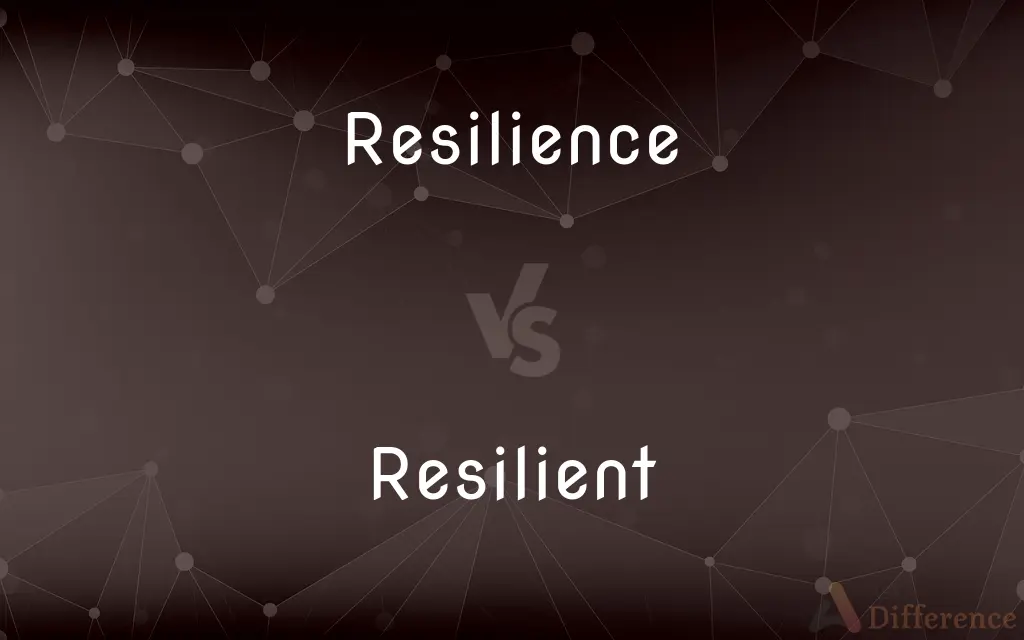Resilience vs. Resilient — What's the Difference?
By Tayyaba Rehman — Updated on November 6, 2023
Resilience refers to the capacity to recover from difficulties; resilient describes someone or something that possesses resilience.

Difference Between Resilience and Resilient
Table of Contents
ADVERTISEMENT
Key Differences
Resilience is the quality of being able to withstand or recover quickly from difficult conditions. The resilient person or object exemplifies this quality in their ability to bounce back.
Resilience is a noun denoting strength or the ability to cope with hardship. Materials that are resilient have the capacity to return to their original shape after being compressed or bent.
The concept of resilience can be applied to systems, individuals, and communities, indicating their ability to adapt and thrive despite challenges. Resilient entities possess the traits necessary for resilience.
In psychology, resilience refers to the mental reservoir of strength that individuals can call upon in times of need to carry them through without falling apart. Psychologically resilient individuals can handle adversity and rebuild their lives after a setback.
In ecology, resilience is the capacity of an ecosystem to resist and recover from disturbances such as environmental changes or natural disasters. Ecologically resilient habitats can sustain such shocks without losing their fundamental functions or structure.
ADVERTISEMENT
Comparison Chart
Part of Speech
Noun
Adjective
Definition
The capacity to recover quickly from difficulties.
Able to withstand or recover quickly from difficult conditions.
Usage in a Sentence
Resilience is crucial for mental health.
A resilient material can endure significant stress.
Application
Often used in a psychological or systemic context.
Used to describe people, objects, or systems.
Synonyms
Toughness, elasticity, durability.
Tough, flexible, durable.
Compare with Definitions
Resilience
The capacity of an ecosystem to resist and recover from environmental changes.
The wetland's resilience to pollution is under study.
Resilient
Capable of withstanding shock without permanent deformation or rupture.
The bridge was designed to be resilient against earthquakes.
Resilience
Psychological strength to cope with stress and hardship.
His resilience after personal loss inspired the whole community.
Resilient
Able to recover from or adjust easily to misfortune or change.
Children are often more resilient than adults.
Resilience
The ability of a system to handle disruption and maintain function.
The resilience of the supply chain was tested during the global crisis.
Resilient
Quick to recover from depression or discouragement.
His resilient nature meant he was never down for long.
Resilience
The capability of material to return to its original shape after deformation.
Rubber is valued for its resilience in manufacturing.
Resilient
Bouncing back into shape readily.
The new phone screen is made of a resilient material.
Resilience
The capacity to recover quickly from difficulties; toughness
The often remarkable resilience of so many British institutions
Resilient
Persisting through challenging circumstances.
The resilient community rebuilt their town after the flood.
Resilience
The ability of a substance or object to spring back into shape; elasticity
Nylon is excellent in wearability, abrasion resistance and resilience
Resilient
Capable of returning to an original shape or position, as after having been compressed.
Resilience
The ability to recover quickly from illness, change, or misfortune; buoyancy.
Resilient
Able to recover readily, as from misfortune.
Resilience
The property of a material that enables it to resume its original shape or position after being bent, stretched, or compressed; elasticity.
Resilient
Returning quickly to original shape after force is applied; elastic.
Resilience
The mental ability to recover quickly from depression, illness or misfortune.
Resilient
(materials science) Having the ability to absorb energy when deformed.
Resilience
(physics) The physical property of material that can resume its shape after being stretched or deformed; elasticity.
Resilient
Returning quickly to normal after damaging events or conditions.
Resilience
The positive capacity of an organizational system or company to adapt and return to equilibrium after a crisis, failure or any kind of disruption, including: an outage, natural disasters, man-made disasters, terrorism, or similar (particularly IT systems, archives).
Resilient
Having the ability to recover from mental illness, trauma, etc.; having resilience.
Resilience
The capacity to resist destruction or defeat, especially when under extreme pressure.
Resilient
Leaping back; rebounding; recoiling.
Resilience
The act of springing back, rebounding, or resiling; as, the resilience of a ball or of sound.
Resilient
Recovering readily from adversity, depression, or the like
Resilience
The power or inherent property of returning to the form from which a substance is bent, stretched, compressed, or twisted; elasticity[1]; springiness; - of objects and substances.
Resilient
Rebounds readily;
Clean bouncy hair
A lively tennis ball
As resiliant as seasoned hickory
Springy turf
Resilience
The power or ability to recover quickly from a setback, depression, illness, overwork or other adversity; buoyancy; elasticity[2]; - of people.
Resilience
The mechanical work required to strain an elastic body, as a deflected beam, stretched spring, etc., to the elastic limit; also, the work performed by the body in recovering from such strain.
Resilience
The physical property of a material that can return to its original shape or position after deformation that does not exceed its elastic limit
Resilience
An occurrence of rebounding or springing back
Resilience
The ability to recover quickly from illness.
Her resilience to the flu virus surprised her doctors.
Common Curiosities
How do you use resilient in a sentence?
The material used in this product is resilient to wear and tear.
What is a resilient person like?
A resilient person is adaptable and recovers quickly from challenges.
Is resilience a skill that can be developed?
Yes, resilience can be strengthened with practice and support.
Can organizations demonstrate resilience?
Yes, organizations can exhibit resilience through adaptability and recovery from setbacks.
What does resilience mean?
Resilience means the ability to recover quickly from difficulties.
Are resilience and endurance the same?
Not exactly; endurance is about withstanding, while resilience is about recovering.
What makes a material resilient?
A material is resilient if it can return to its original shape after being stretched or compressed.
Can resilience be measured?
Resilience can be assessed in various ways, depending on the context.
Does resilient refer only to emotional strength?
No, resilient can also refer to physical properties and adaptability in objects or systems.
How does being resilient affect one’s mental health?
Being resilient positively affects mental health by enabling coping with stress.
Can resilience be a negative trait?
While typically positive, excessive resilience might prevent someone from recognizing when to seek help.
How can a community build resilience?
A community builds resilience through preparedness, adaptation, and support systems.
Are children naturally resilient?
Children have a capacity for resilience, but it can be nurtured or hindered by their environment.
What is the opposite of resilient?
The opposite of resilient is fragile or easily damaged.
Does resilience always mean bouncing back to the original state?
Not always; sometimes it means adapting to a new reality in a positive way.
Share Your Discovery

Previous Comparison
Toothpaste vs. Nurdle
Next Comparison
Carbonyl vs. CarboxylAuthor Spotlight
Written by
Tayyaba RehmanTayyaba Rehman is a distinguished writer, currently serving as a primary contributor to askdifference.com. As a researcher in semantics and etymology, Tayyaba's passion for the complexity of languages and their distinctions has found a perfect home on the platform. Tayyaba delves into the intricacies of language, distinguishing between commonly confused words and phrases, thereby providing clarity for readers worldwide.














































